Major Highlights:
10-Bedded Makeshift Hospital inaugurated at NDRF 8th Battalion Centre, Ghaziabad
A modern, durable, portable, fast installable, safe and varying weather compatible 10- Bedded Make-Shift Hospital was inaugurated by Dr. Harsh Vardhan, Minister (S&T, ES and H&FW) at NDRF 8th Battalion Centre, Ghaziabad. The make-shift hospital has been set up by CSIR-Central Building Research Institute, Roorkee in collaboration with National Disaster Response Force (NDRF), Ministry of Home Affairs for demonstration purpose as well as use of NDRF. It is aimed at serving the purpose for disaster recovery stage including for use in long pandemic or emergency situation.
10-Bedded Make Shift Hospital and isolation centre inaugurated at NDRF 4th Battalion Centre, Chennai
Union Minister for Science & Technology, Earth Sciences and Health & Family Welfare, Dr. Harsh Vardhan inaugurated a 10-Bedded Make Shift Hospital and isolation centre set up by CSIR-SERC at 4th Battalion Centre, Chennai, through video-conference.
The new facility at 4th Battalion Centre, NDRF, Chennai is designed as a make-shift hospital solution for the patient to provide primary health facility with safety, security and a comfortable living environment and has a long life span of up to 20 years. It demonstrates a modern, fast deployable technology useful for disaster recovery as well as long pandemic or emergency situation. The CSIR-SERC laboratory introduced a foldable and framed steel structure, such that a single person can carry a couple of frames on his shoulder and assemble these at any site without much loss of time.
MoU signed with Marikar Green Earth Pvt Ltd for technology transfer and establishing manufacturing plant for biodegradable plates using agro-waste
The CSIR-National Institute for Interdisciplinary Science and Technology (NIIST) has come up with an alternative to single-use plastics. NIIST scientists have developed a technology for manufacturing biodegradable tableware - including plates, cutleries and cups - from agricultural residues and by products. The know-how was licensed to Marikar Green Earth Pvt Ltd last week.
Pilot Plant for Continuous Flow Manufacture of Silver Nanowires inaugurated
CSIR-National Chemical Laboratory (NCL has developed the world’s most inexpensive technology for continuous large scale production of precision silver nanowires on a large scale. This technology development was carried out under the Advanced Manufacturing Technologies (AMT) initiative by the Department of Science and Technology (DST). With this technology developed at CSIRNCL, Indian industries will be able to enter into manufacturing of this precision material. Patents have been filed to protect the technology and the product has been tested for various applications including conducting inks in various forms.
3D-Printed Patient-Specific Medical Implants developed
CSIR-Central Scientific Instruments Organisation (CSIO has developed a technology for manufacturing patient-specific medical implants for several human body parts. The technology has been recently transferred to industry for commercial production and marketing of the product.Patient-specific implants are required in trauma, diseases like cancer, fungal infection or other reconstructive surgeries for specifically targeted patients. Patientspecific implants are also required in the case of unavailability of implants for specific sites of the human body or when available implants do not fulfil the anatomical requirement of a patient. Researchers worldwide are in a race to make patient-specific implants. Scientists at CSIR-CSIO have attempted to solve this complex problem with the help of ComputerAided Design (CAD) followed by 3D printing of the biocompatible metals. In this process, the patient’s CT-Scan/MRI data is utilised to design the implant with specifications compatible with patients.
Licensing Agreement for Glass-lined Micro-reactors signed
CSIR-NCL has developed the first of their kind miniaturised glasslined flow reactors, where glass is coated on metal, thereby increasing the chemical compatibility of the reactors without compromising on its performance. These micro-reactors are the first of their kind among the existing microreactors and flow reactors typically available in metals, polymers, glass and ceramic. They are expected to occupy a niche place in chemical manufacturing and the team will work closely with GMM Pfaudler Ltd. for developing the successful implementation of the technology.
CSIR Compendium of COVID-19 mitigation technologies released
Minister of Science &Technology, Earth Sciences and Health & Family Welfare released a compendium of Covid-19 technologies and products developed by CSIR. The compendium covers a wide range of technologies and products spanning from diagnostics to drugs to ventilators and PPEs with more than 100 technologies, 93 industry partners listed and with over 60 of these technologies have been transferred to industry. Dr Harsh Vardhan observed that “The portfolio of technologies and products developed in a short time are a testament to the capabilities of CSIR scientists and that they can deliver in most difficult of the circumstances”. He complimented the efforts of the scientists, students and staff of CSIR for developing these technologies and products at such short notice in these challenging conditions. He said that “The compendium brought out by CSIR captures the technologies and products well in one place and can help industries and other agencies who are seeking solutions for Covid-19 to access them easily.”
Drug Discovery Hackathon
CSIR and All India Council for Technical Education (AICTE) have launched a hackathon for drug discovery for Covid-19 disease. The Principal Scientific Adviser of the Government of India is supporting the hackathon. The ideas holding potential that emerge from the hackathon will be developed by CSIR labs, startups and any other interested organisation. Indian students and researchers from across the world can participate in the competition.
Guidelines for Public Transport Formulated by CSIR
The CSIR-Central Road Research Institute (CSIR-CRRI) has formulated Guidelines for Public Transport and Feeder Modes considering Social Distancing Norms detailing safety measures for every mode of public transport. The guidelines were released by Union Minister for Science & Technology and Health & Family Welfare, Dr Harsh Vardhan, who said, “Post COVID-19, a new normal will develop in the society, setting new standards to live in a better way, in a scientific way which will eventually become Good Health Norms.”
Peptide discovered for Effective in Fighting Rheumatoid Arthritis
CSIR-Central Drug Research Institute has recently reported that a specific fragment of a protein potentially helps in treating rheumatoid arthritis. Besides reducing the inflammation in joints, it also prevents the joint bones from being destroyed. This protein does not affect the overall immune system of the body and instead selectively protects the joints in case of rheumatoid arthritis. This protein is secreted by a liver fluke or parasitic worm called Fasciola which helps these parasites in concealing their identity from the host immune system by diminishing the inflammatory attack that is set in motion by the host as a defensive strategy to kill the parasites. This protein is called Fasciola Helminth Defense Molecule-1 (FhHDM-1)and is similar to a human protein that plays an important role in reducing inflammatory responses. The liver fluke protein also has a very high anti-inflammatory response. This similarity motivated the CSIR-CDRI researchers to investigate the protein and to employ it in treating rheumatoid arthritis. The CDRI researchers are considering this study as an important breakthrough in terms of effectiveness and selectivity in treating rheumatoid arthritis. Future studies are necessary for developing this peptide for clinical use.
CSIR partnered clinical trials on COVID-19 (CuRED) portal launched
Dr Harsh Vardhan, Minister of Science & Technology, Health and Family Welfare and Earth Sciences, launched a website that gives comprehensive information about the numerous COVID-19 clinical trials that CSIR is engaged in partnership with industry, other government departments and ministries.
Called CuRED or CSIR Ushered Repurposed Drugs, the website provides information about the drugs, diagnostics and devices including the current stage of the trials, partnering institutions and their role in the trials and other details. The site can be accessed at https://www.iiim.res.in/cured/ or http://db.iiim.res.in/ct/index.php.
The Minister lauded the efforts of CSIR for being at the forefront of the ongoing fight against COVID-19 and prioritising clinical trials, generating data for their regulatory approval and helping launch drugs and diagnostics in the market. He commended the approach of using repurposed drugs and also, synthesising COVID-19 drugs through new processes and transferring to Industry.
CSIR is exploring multiple combination clinical trials of anti-virals with host-directed therapies for the potential treatment of COVID-19. CSIR is also working with the Ministry of AYUSH for clinical trials of AYUSH drugs and has undertaken safety and efficacy trials of AYUSH prophylactics and therapeutics based on individual plant-based compounds and in combination. Five clinical trials involving Withaniasomnifera, Tinosporacordifolia + Piper longum(in combination), Glycyrrhizaglabra, Tinosporacordifolia & Adhatodavasica (individually and in combination) and AYUSH-64 formulation are undergoing safety and efficacy trials.
Pravasi Bharatiya Academic and Scientific Sampark (PRABHASS) portal launched
Under the directives of Prime Minister, Council of Scientific and Industrial Research (CSIR) initiated the efforts to develop a database and a virtual platform to bring on board the Global Indian S&T Community to address the Indian societal challenges / problems.
The virtual platform, a portal, is named PRABHASS which means a ray of light, and is an acronym for “Pravasi Bharatiya Academic and Scientific Sampark - Integrating Indian Diaspora with the Mother Land”. PRABHASS is being developed with collaborative effort of all major scientific ministries / departments and the Ministry of External Affairs of India with the following Vision and Objectives:
The vision of the portal is to serve as National Digital Platform to effectively collaborate with Global Indian S&T Community for collectively promoting inclusive growth in India, strengthening Indian innovation ecosystem and contributing towards nation building.
Sustainable Processing of Municipal Solid Waste: ‘Waste to Wealth’
The CSIR-CMERI developed Municipal Solid Waste Processing Facility has not only helped achieving decentralized decimation of solid wastes, but has also helped create value-added end-products from abundantly available redundant stuffs such as dry leaves, dry grass etc. The MSW Processing Facility is developed for disposal of solid waste in a scientific way following the Solid Waste Management Rules (SWM) 2016 prescribed by Union Ministry of Environment, Forests and Climate Change (MoEF&CC), Govt. of India. The primary focus of CSIR-CMERI is to unburden the common households from the segregation responsibilities through advanced segregation techniques. The mechanized segregation system segregates solid waste into metallic waste (metal body, metal container etc.), biodegradable waste (foods, vegetables, fruits, grass etc.), non-biodegradable (plastics, packaging material, pouches, bottles etc.) & inert (glass, stones etc.) wastes. The bio-degradable component of the waste is decomposed in an anaerobic environment popularly known as bio-gasification. In this process biogas is liberated through conversion of organic matter. The biogas can be used as fuel for cooking purpose. The gas can also be utilized in gas engine for generation of electricity. The residual slurry from biogas plant is converted to compost in a natural process known as vermi-composting by introducing earthworms. The vermi-compost is utilized in organic farming.
Eco-friendly , efficient and DME fired “Aditi Urja Sanch” Unit launched
The Union Minister of Science and Technology and Earth Sciences, Dr. Harsh Vardhan inaugurated the DME fired “Aditi Urja Sanch” unit along with the DME-LPG blended fuel cylinders and handed them over for common public and CSIR-NCL (National Chemical Laboratory) canteen use on a trial basis at CSIR-NCL premises virtually through video-conferencing.
Dimethyl ether (DME) is an ultra-clean fuel. CSIR-NCL has developed nation’s first kind of DME pilot plant with 20-24Kg/day capacity. The conventional LPG burner is not suitable for DME combustion as DME density is different than LPG. To address this issue, CSIR- NCL’s “ADITI URJA SANCH” has come up with a helpful, innovative setup. The new Burner is fully designed and fabricated by NCL for DME, DME -LPG blended mixtures and LPG combustion.
The newly designed stove can burn with up to 30 % DME blended with LPG or 100% DME as fuel. The air to fuel ratio is different for DME blended fuel to achieve optimum combustion and thermal performance. A 20% DME blending with LPG, with fewer infrastructure changes, is expected to result in substantial savings annually. The DME from Methanol process developed by CSIR-NCL is producing 20-24 kg/ day. This economical, cost-effective process will be scaled up to 0.5 Ton per day through CSIR-FTC project. CSIR-NCL plans under “Aditi UrjaSanch” to launch in future industrial burners for low emission, DME/ DME blended fuel for automobiles and stationery power.
CSIR Foundation Day celebrated
CSIR celebrated its 79th Foundation Day on 26the September 2020. Dr Harsh Vardhan, Union Minister of Science and Technology, Earth Sciences, Health and Family Welfare and Vice President, presided over the event. While, Dr. Shekhar C. Mande, DG, CSIR & Secretary, DSIR (Department for Scientific & Industrial Research) and Mr. A. Chakraborty, Head, HRDG, were present on the occasion, all CSIR labs and several others joined the event through various social media platforms.
On the occasion of CSIR Foundation Day, Avra Laboratories, a leading pharmaceutical company founded by Padmabhushan Dr A. V. Rama Rao, announced that it would establish three research chairs at CSIR to support and recognize exemplary work in the field of translational research. The chairs, will provide a three-year fellowship to selected scientists to recognize and advance their efforts. Dr S. Chandrasekhar, Director, CSIR-Indian Institute of Chemical Technology and Dr Amol A. Kulkarni, Senior Principal Scientist, CSIR-National Chemical Laboratory have been awarded the fellowship for the period 2020-2023.
As part of their Corporate Social Responsibility program, Hindustan Aeronautics Limited (HAL), has agreed to extend generous funding support to Establishment of one Makeshift Hospital in Himachal Pradesh and a COVID Testing Centre at Ladakh at a cost of over a crore".
The prestigious CSIR Diamond Jubilee Technology Award for the year 2019 is conferred on Tata Chemicals Limited (TCL), Pune for the technological advancement it has made in the production of 'Fructo-oligosaccharides' (FOS), also known as FOSSENCE which being 100./0 soluble dietary fiber caters to the growing base of health and lifestyle-conscious consumers.
CSIR and Mylan Announce Partnership to identify Advance Therapeutic Options for Management of COVID – 19
CSIR and Mylan Laboratories Limited, the India-based subsidiary of leading global pharmaceutical company Mylan entered into a partnership to address unmet patient needs amidst the evolving COVID-19 pandemic. Under the partnership, CSIR’s constituent laboratory Indian Institute of Chemical Technology (CSIR-IICT), and Mylan will collaborate to identify potential therapies for COVID-19.
A series of clinical trials will be conducted towards new and innovative solutions to manage COVID-19 pandemic in India as part of this collaboration. The first of the clinical trial to be rolled out is a multiple arm phase 3 study that will be conducted in adult patients with mild to moderate COVID -19 at risk of complications.
Technology transfer of Community level Water Purification system by High Flow Rate Fluoride & Iron Removal
The CSIR-CMERI transferred its High Flow Rate Fluoride & Iron Removal technology to M/s Capricans Aqua Private Limited, Howrah, West Bengal, in Durgapur (WB). This Community Level Water Purification System has a Flow-Rate capacity of 10,000 Ltr/hr and uses commonly available raw materials such as sand, gravel and adsorbent materials. It comprises a three-stage purification process which purifies water within permissible limits (1.5 ppm & 0.3 ppm for Fluoride and Iron respectively). The technology uses a combination of Oxidation, Gravitational Settling and Chemisorption process in an Affordable Package. The integrated backwashing profile of the technology will help in improving the shelf-life of the filtration media in a resource rationalised manner.
CSIR-SERC, Chennai Develops Indigenous Emergency Retrieval System (ERS) for Power Lines
CSIR-SERC has developed an indigenous technology, Emergency Retrieval System (ERS), for quick retrieval of power transmission in the event of failure of transmission line towers. CSIR-SERC has signed an agreement for licensing of the ERS technology with M/s Advait Infratech, Ahmedabad.At present, the ERS systems are imported. There are very few manufacturers across the world and the cost is relatively high. This technological development will enable the manufacturing in India for the first time, which will be an import substitute and will cost about 40% of imported systems. ERS has huge market requirement in India as well as in SAARC and African countries. Hence, this technological development is a big leap forward towards Atma Nirbhar Bharat and Make in India.
The agreement was signed in the presence of Prof. Santosh Kapuria, Director, CSIR-SERC, Chennai and Shri S.K. Ray Mohapatra, Chief Engineer (PSE & TD), Central Electricity Authority, New Delhi.
Phytorid Technology Sewage Treatment Plant (STP) set up at NCL-Pune
Union Minister of Science & Technology, Earth Sciences and Health & Family Welfare Dr. Harsh Vardhan inaugurated the eco-friendly and efficient Phytorid Technology Sewage Treatment Plant (STP) at CSIR-National Chemical Laboratory (NCL)-Pune. The Hon’ble Minsiter said that treatment of sewage water is essential to meet the challenge of water scarcity in coming years. He called upon Council of Scientific and Industrial Research (CSIR) scientists to scale up their sewage treatment technology and install it in all their campuses across the country.The Minister appreciated the Sewage treatment using Phytorid Technology by the CSIR scientists and said that it was a natural treatment method by which treated water could be utilised for various purposes including for drinking. Phytorid is a subsurface mixed flow constructed wetland system developed and internationally patented by CSIR-NEERI, Nagpur with successful demonstration in the field for more than 10 years of continuous operation as a stand-alone sewage treatment system. Phytorid is a self sustainable technology for wastewater treatment that works on the principle of natural wetland. It uses certain specific plants which can absorb nutrients directly from wastewater but do not require soil. These plants act as nutrient sinker and remover. Using Phytorid Technology for the treatment of sewage, it is possible to recover and reuse the treated water for gardening purposes.
India International Science Festival-2020 sets five Guinness Records, attracts over 1.3 lakh participants
The sixth edition of India International Science Festival was held online during 22-25 December 2021. With 41 events that saw over 1.3 lakh participants, the event set a Guinness World Record for the largest digital science event organized. The theme of the year’s IISF was ‘Science for Self-Reliant India and Global Welfare’. Hon’ble Prime Minister, Shri Narendra Modi inaugurated the event. The hon’ble PM said, “India has a rich legacy in science, technology and innovation. Our scientists have done path breaking research. Our tech industry is at the fore-front of solving global problems. But, India wants to do more. We look at the past with pride but want an even better future.” The Valedictory Session of the megaevent was graced by the Hon’ble Vice President of India, Shri Venkaiah Naidu. IISF-2020 was organized by CSIR, Depart of Science and Technology, Ministry of Earth Science, Department of Biotechnology, Ministry of Health and Family Welfare along with Vijnana Bharathi
Memorandum of Agreement signed between CGWB and CSIR-NGRI for High-Resolution Aquifer Mapping & Management in Arid Region of North-Western India
A Memorandum of Agreement (MoA) was signed between Central Ground Water Board (CGWB), Ministry of Jal Shakti and CSIR-NGRI, Hyderabad for use of advanced heliborne geophysical survey and other scientific studies in parts of the States of Rajasthan, Gujarat and Haryana under the Aquifer Mapping Programme. The MoA was signed by Chairman, CGWB and Director, CSIR-NGRI in the august presence of the Union Minister of Jal Shakti, Shri Gajendra Singh Sekhawat, and Union Minister of Science and Technology,Health and Family Welfare and Earth Sciences, Dr. Harshvardhan in New Delhi. Under phase- I of the project, an area of nearly 1 lakh sq km spreading over nearly 65,500 sq km of western arid Rajasthan (covering parts of Bikaner, Churu, Ganaga Nagar, Jalor, Pali, Jaisalmer, Jodhpur and Sikar districts), 32,000 Sq. Km arid parts of Gujarat (covering Rajkot, Jamnagar, Morbi, Surendranagar and Devbhumi Dwarka districts) and nearly 2500 sq km of Haryana (covering Kurukshetra and Yamuna Nagar districts) would be covered at an estimated cost of 54 Crores.
Diagnostic Testing of Coronavirus Samples
CSIR is deeply involved in the testing of human samples for the presence of coronavirus infection using the RT-PCR test. Several of its laboratories are engaged in the work, and 13 CSIR labs across the country are testing, and as of mid-December, more than 7.0 lakh samples have been tested with CSIR-IITR and CSIR-CDRI having tested more than 1.5 and 1.0 lakh respectively. CSIR labs have also engaged in training of Human Resources for testing and have helped many hospitals and research institutes in carrying out RT-PCR. CSIR-CCMB is the only non-ICMR but ICMR-approved validation centre that is approved to test the different kits that are being used in COVID-19 testing.
Molecular Surveillance for SARS-CoV-2
CSIR laboratories have undertaken sequencing of SARS-CoV-2 to find the type of strains present in India and to understand if the virus undergoes genetic changes while it is spreading in the country. Several CSIR labs have sequenced the SARS-CoV-2 genome samples from Indian isolates, and more than 2000 have been sequenced and analysed providing insights into the strains prevalent in India.
Serological Surveillance of SARS-CoV-2
Several CSIR labs are participating in CSIR Phenome India Project led by CSIR-IGIB which is a long-term longitudinal observational cohort study of health outcomes within its employees with an aim to develop risk prediction tools and play an important role towards establishing precision health and medicine for the Indian population. In this regard, the Covid19 serological tests have been conducted across CSIR labs in the country spearheaded by CSIR-IGIB, and more than 10,000 samples have been tested. Repeat testing is on after three months for the positive cases.
Bharatiya Nirdeshak Dravya (BND®) released
BPCL Quality Assurance (QA) department and M/s Aashvi Technology LLP (ATL) joined hands with CSIRNational Physical Laboratory (CSIRNPL) for manufacturing and marketing of “Bharatiya Nirdeshak Dravya” (Certified Reference Material) to ensure correct and accurate results of Lab Instruments under the “AtmaNirbharBharat” programme of Honourable Prime Minister of India. The BNDs (Bharatiya Nirdeshak Dravya) were released at CSIR-NPL, New Delhi on 18 August 2020. CSIRNPL is the only National Metrological Institute of India with direct traceability to SI units. Petroleum & Petrochemical Laboratories will use the CRM (BND) for calibration of the equipment. In India, almost 200 Laboratories (including PSUs & Pvt. labs) catering to Petroleum fuel testing will be benefited by using cheap indigenous BND. This will result in cost reduction to the tune of at least 50% and saving of foreign exchange as well. The possibility of exporting the BNDs to neighbouring south Asian countries is also being explored.
MoU between CSIR and FSSAI for Collaborative Research and Information Dissemination regarding Food and Nutrition
Dr Harsh Vardhan, Union Minister for Health and Family Welfare presided the signing of an MoU between Food Safety and Standards Authority of India (FSSAI) under the Ministry of Health & Family Welfare and Council of Scientific & Industrial Research (CSIR) in the presence of Shri Ashwini K. Choubey, Minister of State (HFW) on 7 August 2020. The MoU seeks to promote collaborative research and information dissemination in the area of food and nutrition.
Congratulating both FSSAI and CSIR for this innovative step that will merge the potential and faculties of both the premier organisations, Dr Harsh Vardhan said that the MoU will enable identification of technologies and programmes to be developed in the area of food safety and nutrition research, along with recognition of innovative technologies available with CSIR for deployment by the Indian businesses and/or for regulating compliances. It will also seek collection of data regarding food consumption, incidence and prevalence of biological risk, contaminants in food, identification of emerging risks, their mitigation strategies and introduction of rapid alert system.
Dry-Swab-Direct-RTPCR Diagnostic for Covid-19
The simple and fast method of Dry Swab-Direct RT-PCR, developed by CSIRs constituent lab CCMB, Hyderabad, for scaling up of SARS-CoV-2 detection has been approved by ICMR based on their independent validation. This method is a simple variation of the existing gold standard RT-PCR method and can easily scale up the testing by 2 to 3 fold with no new investment of resources and training and makes diagnostic tests simpler, faster and cheaper scaling up the testing in the country immediately.
SpiceHealth has signed a Memorandum of Understanding (MoU) with CSIR-CCMB for faster testing of Covid-19. This MoU with CSIR-CCMB is for conducting these tests in SpiceHealth’s mobile testing laboratories. The Apollo Hospitals is also collaborating with CSIR-CCMB for joint manufacturing and commercialisation of the innovative dry swab test.
CRISPR/ Cas based paper diagnostic test FELUDA for Covid-19
A CRISPR/ Cas-based paper diagnostic test has been developed by CSIR. The FELUDA methodology has been developed in CSIR-IGIB for detecting single nucleotide variants in RNA or DNA or more broadly detecting any DNA or RNA fragment, without the need for sequencing. The principle of discrimination is derived from the natural property of the enzyme being used for the invention, Francisella novicida Cas9 (FnCas9) which shows a very low binding affinity to mismatched substrates. CSIR has licensed this technology to TATA Sons. The kit has been approved by DCGI and TATA has launched this as TATA MD CHECK.
 Cost-effective process developed for Favipiravir
Cost-effective process developed for Favipiravir
A cost-effective process of Favipiravir for the treatment of COVID-19 patients has been developed by CSIR-IICT. CSIR-IICT developed a cost-effective process using locally available chemicals to synthesise this Active Pharmaceutical Ingredient (API) and transferred the technology to Cipla. Cipla has launched this in the market as Ciplenza.
Clinical trials of Sespivac (Mycobacterium W) for Covid-19
CSIR and Cadila Pharmaceuticals are conducting clinical trials to evaluate the efficacy of an existing gram-negative sepsis drug, called Sepisvac for COVID19 patients. The drug contains heat-killed Mycobacterium (Mw) and has been clinically developed and approved for gram-negative sepsis, a severe infection and is available commercially as Sepsivac® from Cadila Pharmaceuticals Ltd. After successful completion of Phase II trials on critically ill Covid-19 patients, Phase III trials are underway.
Clinical trials of Ayurveda based drugs for Covid-19
For the prophylaxis and management of COVID-19 in the population with mild to moderate disease, CSIR and Ministry of AYUSH have joined hands to validate some of the traditional AYUSH formulations for their safety and efficacy through scientific evidence. Five clinical trials are currently under progress.
SwasthVayu: Bi-Level Positive Airway Pressure (BiPAP) System Portable Ventilator developed
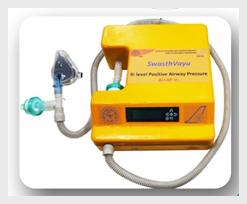 CSIR-NAL developed a low-cost indigenised, non-Invasive bi-level positive airway pressure ventilator device named as “SwasthVayu”. Developed in 36 days, it is a cost-effective device, easy to use in Makeshift hospitals, wards, dispensary and has three modes of operation, continuous, timed and spontaneous. It has successfully passed stringent electrical safety, performance, calibration, bio-compatibility tests at NABL accredited laboratory and certified. It has undergone clinical trials at many hospitals, and CSIR-NAL is providing 1200 ventilators to the Delhi Government.
CSIR-NAL developed a low-cost indigenised, non-Invasive bi-level positive airway pressure ventilator device named as “SwasthVayu”. Developed in 36 days, it is a cost-effective device, easy to use in Makeshift hospitals, wards, dispensary and has three modes of operation, continuous, timed and spontaneous. It has successfully passed stringent electrical safety, performance, calibration, bio-compatibility tests at NABL accredited laboratory and certified. It has undergone clinical trials at many hospitals, and CSIR-NAL is providing 1200 ventilators to the Delhi Government.
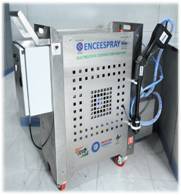 Design and development of an Electrostatic Disinfection Unit
Design and development of an Electrostatic Disinfection Unit
An electrostatic disinfection unit has been developed by CSIR-CSIO for a 360-degree area and uniform coverage, small droplet size, applicable for all fluid types. The technology was transferred to BHEL, Rite water, M/s. Jhosna Corporation and M/s. Dashmesh Industries. Close to 200 units have been produced. Further, the unit ENCEESPRAY selected for Top COVID-19 Innovation Award with RITE Water Solution Pvt. Ltd, Nagpur, CSIR-CSIO and Univ. of Florida as partners by USISTEF.
Nasal-pharyngeal (NP) Swabs for COVID-19 sample collection
 CSIR-NCL has developed NP swabs that can be used for Covid19 sample collection. It is an appropriately small size for paediatric, nasopharyngeal or urethral genital sample collection. Approved by ICMR, the technology has been licensed to Ms. Chembond Polymers and Materials Pvt. Ltd. (CPML), Mumbai. CPML has now started commercial manufacturing of these nasal swabs under the name, “KEMYLON SWABS”. The company has established a facility to produce 1 lakh swabs/day.
CSIR-NCL has developed NP swabs that can be used for Covid19 sample collection. It is an appropriately small size for paediatric, nasopharyngeal or urethral genital sample collection. Approved by ICMR, the technology has been licensed to Ms. Chembond Polymers and Materials Pvt. Ltd. (CPML), Mumbai. CPML has now started commercial manufacturing of these nasal swabs under the name, “KEMYLON SWABS”. The company has established a facility to produce 1 lakh swabs/day.
PPE Coveralls developed
CSIR-NAL in a joint Venture with M/s. MAF Clothing Pvt Limited has developed the PPE Coveralls with Indigenous heat sealing tape and polypropylene materials. These are developed indigenously for frontline health workers involved in the containment zone of Covid-19. CSIR-NAL has prepared and implemented a strict Quality Assurance Plan, and the developed coverall passes ASTM F1670 and ISO 16603 tests and has been tested and passed for blood penetration test as required for covid-19.

Aarogyapath (आरो_यपथ) – Healthcare Supply Chair Management System developed
Aarogyapath (आरो_यपथ) has been developed as the National Healthcare Supply Chain Management System to address COVID-19 and any future national pandemic. https://www.aarogyapath.in, a CSIR National Healthcare Supply Chain Portal that aims to provide real-time availability of critical healthcare supplies was launched.
Kisan Sabha App – Connecting farmer to the supply chain
Kisan Sabha App has been developed by CSIR-CRRI to connect farmers to the supply chain and freight transportation management system. This portal acts as a one-stop solution for farmers, transporters, and other entities engaged in the agriculture Industry. The App is is being used widely and has had more than 60,000 downloads so far.


Clinical trials of Anti-Cancer Drug received DGCI approval
The IND application of IIIM-290 (anticancer lead) has been approved by DCGI, for conducting Phase I/II clinical trial in pancreatic cancer patients.
Formulation of Guidelines for Evaluation of Nano-based agri-input and food products in India
CSIR-IITR contributed to the Guidelines for Evaluation of Nano-based agri-input and food products in India released on 7th July 2020 by Dr Harsh Vardhan, Hon'ble Union Minister for Science & Technology, Earth Sciences, Government of India. CSIR- IITR, has contributed significantly in the area of nanotoxicology as well as food safety.
Trials of car fitted with Fuel Cell Technology (LT-PEMFC) Stack successfully ran by CSIR and KPIT Ltd.
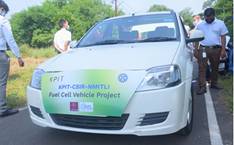 CSIR and KPIT Technologies Ltd. successfully ran trials of India’s first Hydrogen Fuel Cell (HFC) prototype car running on an indigenously developed fuel cell stack at CSIR-National Chemical Laboratory, Pune. The HFC technology uses chemical reactions between hydrogen and oxygen (from air) to generate electrical energy, eliminating the use of fossil fuels. Further, the fuel cell technology emits only water, thus cutting down the emission of harmful greenhouse gases along with other air pollutants. The fuel cell is a low-temperature PEM (Proton Exchange Membrane) type Fuel Cell that operates at 65-75 degree centigrade, which is suitable for vehicular applications. CSIR and KPIT have developed a ten kWe (Kilowatt-electric) automotive grade LT-PEMFC (low-temperature PEM fuel cell) stack based on the CSIR's know-how.
CSIR and KPIT Technologies Ltd. successfully ran trials of India’s first Hydrogen Fuel Cell (HFC) prototype car running on an indigenously developed fuel cell stack at CSIR-National Chemical Laboratory, Pune. The HFC technology uses chemical reactions between hydrogen and oxygen (from air) to generate electrical energy, eliminating the use of fossil fuels. Further, the fuel cell technology emits only water, thus cutting down the emission of harmful greenhouse gases along with other air pollutants. The fuel cell is a low-temperature PEM (Proton Exchange Membrane) type Fuel Cell that operates at 65-75 degree centigrade, which is suitable for vehicular applications. CSIR and KPIT have developed a ten kWe (Kilowatt-electric) automotive grade LT-PEMFC (low-temperature PEM fuel cell) stack based on the CSIR's know-how.
Safe Biometric-based exploder developed
 The exploders available in the market are found unsafe when it is stolen and misused by the unauthorised person. To avoid misuse, a biometric-based exploder has been developed. It can only be operated by those peoples who are biometrically registered with the specific device. The fingerprint scanner, with the help of embedded micro-controller, registers the authorised personnel using their fingerprint up to 20 numbers. Once registered, no other person can use these devices. The exploder has been developed for both underground and opencast mines. The technology has been transferred to M/s Pranay Enterprises, Hyderabad.
The exploders available in the market are found unsafe when it is stolen and misused by the unauthorised person. To avoid misuse, a biometric-based exploder has been developed. It can only be operated by those peoples who are biometrically registered with the specific device. The fingerprint scanner, with the help of embedded micro-controller, registers the authorised personnel using their fingerprint up to 20 numbers. Once registered, no other person can use these devices. The exploder has been developed for both underground and opencast mines. The technology has been transferred to M/s Pranay Enterprises, Hyderabad.
Anaerobic Gas Lift Reactor (AGR) for generation of biogas and biomanure
CSIR-IICT has developed and patented a high rate biomethanation technology known as ANAEROBIC GAS LIFT REACTOR (AGR) for the generation of biogas and bio manure from organic solid waste like poultry litter, food waste, press mud, cattle manure, organic fraction of municipal solid waste (OFMSW), sewage sludge etc. This technology provides a decentralised treatment option for organic waste based on high rate biomethanation to generate biogas for combined heat and power (CHP) applications. This has been transferred to M/S Ahuja Engineering Services Pvt Limited, Hyderabad and M/s Nyrmalya Bio-Engineering Solutions Pvt. Ltd.
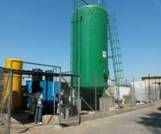
World's Largest Solar Tree fabricated
fabricated
CSIR-CMERI has developed the World’s Largest Solar Tree, which is installed at CSIR-CMERI Residential Colony, Durgapur. The installed capacity of the Solar Tree is above 11.5 kWp and has the annual capacity to generate 12,000-14,000 units of Clean and Green Power. This Solar Tree is a Quantum Leap towards making an Energy Reliant and Carbon Negative India. The solar tree has 35 solar panels, each with a capacity of 330 watts. The solar panels connected through metal branches produce solar power. Has the potential to save 10–12 tons of CO2 from being released into the atmosphere every year. Since the shadow area is minimum in solar trees, they could be set up in agricultural farms to run pumps, e-tractors and tillers as an alternative to diesel. The excess power can be sent to the grid, providing an economic return to farmers.
Made in India aviation weather monitoring system installed at Bengaluru International airport
An indigenously-developed Aviation Weather Monitoring System (AWMS) has been installed at the new runway of Kempegowda International Airport (KIA). With this, KIA has become the first airport in the country to install indigenous AWMS technology, developed by Bengaluru-based CSIR-National Aerospace Laboratories (NAL), at both ends of the new runway. In addition, KIA has installed four Drishti transmissometers – also developed by NAL, in association with the India Meteorological Department (IMD) – to measure the runway visibility range (RVR). KIA has the unique honour of having NAL’s 50th Drishti installed at its runway. The Drishti Transmissometer is acclaimed for precise reporting, helping pilots with an accurate runway visual range. With the web-enabled feature, the data can be accessed, and maintenance carried out from any location. Meanwhile, the 10-meter mast on which AWMS sensors are installed is a first-of-its-kind, designed by NAL, with several unique features, including being eco-friendly and lightweight, with a life of over 60 years. The sliding mechanism enables easy maintenance - a useful feature-considering the busy traffic on the runway. Manufacturing Technology for DRISHTI Transmissometer has been transferred to TATA Power Company Limited - Strategic Engineering Division, Bangalore.
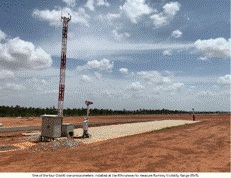

Aviation Weather Monitoring System Drishti Transmissometer
.
High-Power S-band, 2.6 MW, Magnetron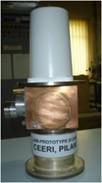
Magnetron, a high-powered vacuum tube, is an essential component for Medical LINAC (Lineal accelerator), which are widely used for external radiation treatment of cancer patients. CSIR-CEERI had, recently, designed and developed 2.6 MW S-band tunable pulsed Magnetron, which was successfully tested and used as a microwave source, to generate the required X-ray dose using a LINAC system for Cancer treatment. On July 14, 2020, the technology know-how for S-band Magneton was transferred to M/s Panacea Pvt. Ltd., Bangalore, known for developing advanced radiotherapy systems for Cancer treatment.
Geochemical baseline atlas under National Geochemical Mapping (NGCM) of soils for 22 elements
First “Geochemical Baseline atlas of India” in continental scale, consisting of geochemical maps of oxides and trace elements in topsoil and bottom soil. This work is a part of the collaborative work with International Union of Geological Sciences (IUGS) Global Geochemical Baselines program where CSIR-NGRI was identified as the Nodal Agency to carry out such studies in India and accordingly have prepared the maps for 22 elements in soil samples.
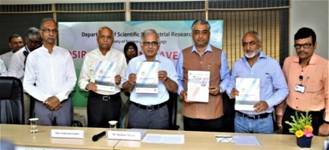
Introduction of Asafoetida (Heeng) cultivation in the Indian Himalayan region
A historical shift in farming practices is in the offing with farmers of the remote Lahaul valley in Himachal Pradesh taking up cultivation of asafoetida (Heeng) to utilise vast expanses of wasteland in the cold desert conditions of the region. In their efforts, the farmers are being supported by scientists of the CSIR-IHBT, Palampur, who brought in seeds of asafoetida and developed its agrotechnology. Since asafoetida is a major condiment in Indian cuisines, team CSIR-IHBT made relentless efforts for introduction of this important crop in the country through proper channel and finally, the institute introduced six accessions of seeds from Iran through ICAR-National Bureau of Plant Genetic Resources (ICAR-NBPGR), New Delhi.
The first seedling of asafoetida was planted by Dr. Sanjay Kumar, Director, CSIR-IHBT on 15th October 2020 at farmer’s field in village Kwaring of Lahaul valley to mark the initiation of cultivation of asafoetida in India.
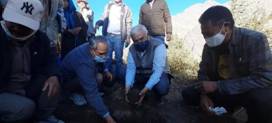
Food Business Accelerator to augment startups set up
CSIR-CFTRI inaugurated a “Food Business Accelerator” in August 2020 to augment its startup Innovation System in the Campus. The Centre is targeted to provide opportunities for prospective entrepreneurs and startups to be part of the Accelerator Facility for a period up to 1 year or so. These companies can explore the avenues for product development, Scale-up operations, packaging and shelf-life studies for commercialising their products. Expert mentoring sessions also will be available.
Foundation for Aerospace Innovation, Research and Entrepreneurship (FAIRE) being set-up
Foundation for Aerospace Innovation, Research and Entrepreneurship (FAIRE) a non-profit technology business incubator for aerospace & allied engineering is being set up by NRDC & FISE at CSIR-NAL, Bengaluru. The facilities, technologies, knowledge base, etc. from the CSIR-NAL will be brought in for commercial exploitation to the potential start-ups and MSMEs for the introduction of novel products and services.
CSIR Innovation Centre for Next Generation Energy Storage Solutions (ICeNGESS) launched
CSIR has launched a Mission Mode Project entitled “CSIR Innovation Centre for Next Generation Energy Storage Solutions (ICeNGESS)” and is being implemented at CSIR-CECRI, Chennai Center. CECRI's premier research in new generation battery systems like lithium-ion, sodium-ion, lithium-sulphur and metal-air battery technologies, has taken a leap forward in its journey towards establishing a CSIR Innovation Centre for Next Generation Energy Storage Solutions at CSIR Madras Complex, Chennai.
*****
NB/KGS/(CSIR Inputs)